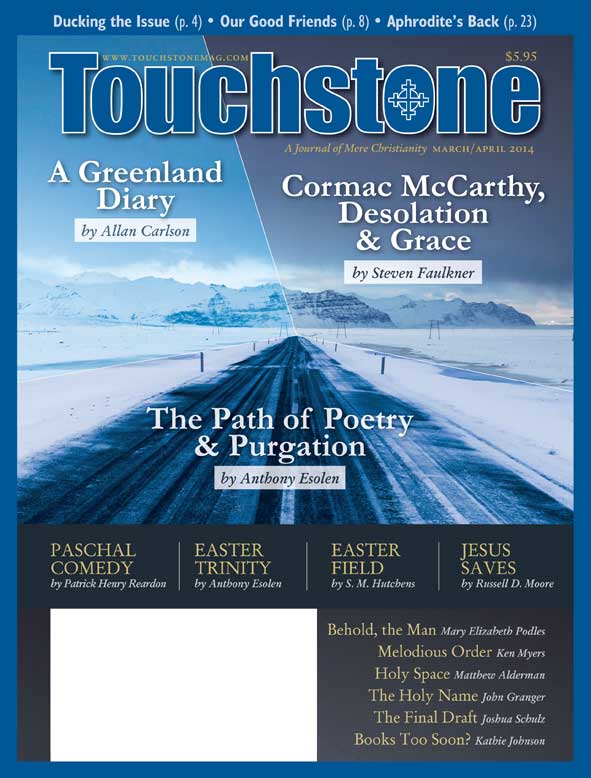CONTOURS OF CULTURE by Ken Myers
Melodious Order
In his 1986 book Foolishness to the Greeks, Lesslie Newbigin argued that the central fact of modern culture is "the elimination of teleology." If one had need of reducing the complex systemic confusions of modernity to a single phrase, he could do a lot worse. Modern culture—submitting abjectly and irrationally to the idol of Choice—cannot acknowledge the existence of purposes or ends in the cosmos that would direct or constrict our choosing.
The genealogy of this idolatry is variously explained, but there is a rough consensus among scholars from various disciplines and diverse belief systems (including some who celebrate modernity) that the Enlightenment of the eighteenth century marked a consolidating and entrenching moment for its prophets and priests. While there were (and are) countless confessing Christians among the defenders of Enlightenment principles and their consequent social and political practices, it is becoming increasingly evident that the assumptions of modernity do not serve the ends of Christian faithfulness and human flourishing.
Evident to whom, one might well ask. One can visit many churches, Christian schools, and parachurch ministries and find all too little in the way of resistance to or renunciation of the modern creed. While books and articles appear almost daily diagnosing the systemic disordering consequences of modern idolatries, such diagnoses have a hard time trickling down. But they are there—like pearls of great price—for those willing to invest some effort. Just on the few shelves in front of me as I write, I can see books that address a remarkably wide range of subjects: freedom, causality, human identity, community, political authority, economics, reason, time, place, language, beauty, the body, sexuality, marriage, family, and healthy patterns of architecture and urban planning. There are books that address how modernity has disarranged and distorted our understanding of how to do theology, the relationship between belief and practice, the proper role of education, and the nature of tradition. And that's only the beginning.
No Clean Sea Breeze for Music
Some might object that such analyses are of interest only to scholars—leisure pursuits of the theory class, which aren't relevant for those outside the academy. But Oliver O'Donovan has warned that "those who do not make an effort to read their times in a disciplined way read them all the same, but with narrow and parochial prejudice." O'Donovan further insists that wisdom about our times requires the detachment and courage "to attend especially not to those features which strike our contemporaries as controversial, but to those which would have astonished an onlooker from the past but which seem to us too obvious to question."
This habit of allowing (in Lewis's metaphor) the clean sea breeze of the centuries to blow through our minds explains why so many thinkers have recovered many pre-modern Christian resources in gaining perspective on modern assumptions. Pre-modern theologians and pastors still believed in teleology; they still believed that one had to account for the purpose and nature of various aspects of our lives if one wanted to live faithfully. They believed in a meaningful cosmos, that the purpose of all matter is (as Hans Boersma puts it) "to lead us into God's heavenly presence, to bring about communion with God, participation in the divine life." Such assumptions are counterintuitive to modern Christians, so we need to immerse ourselves in a different thought-world to recover well-ordered intuitions. And many thoughtful writers have contributed books to equip us for such a recovery in many areas of life—with one glaring exception.
I have come to believe that the sphere of experience in which the challenging of modern assumptions is most difficult (and least pursued) is that of music, both how we experience music and how we explain it. "Christians today live in a society whose musical thought is based on post-Enlightenment presuppositions," writes Calvin Stapert, "and the music we typically identify with as 'ours'—whether we have 'classical' or 'popular' inclinations—is also overwhelmingly post-Enlightenment. Our musical thought and practice have largely bought into the ideas and practices that came out of the Enlightenment and Romanticism."
One could substitute for music in this claim "reason," "freedom," "time," or "the body," and, in many Christian circles, see many heads nod in sage agreement. But I have rarely been in circles where our captivity to modernity's myths about music is acknowledged. As Stapert observes,
pre-Enlightenment musical thought has all but vanished. Some music students are still required to read a few bits of pre-Enlightenment musical thought; but even for most music students, let alone the general populace, the musical ideas of Plato or St. Augustine, of John Calvin or Andreas Werckmeister, are largely unknown. Furthermore, the little that is known is considered nothing more than an outdated, irrelevant curiosity.
So much for clean sea breezes.
Ken Myers is the host and producer of the Mars Hill Audio Journal. Formerly an arts editor with National Public Radio, he also serves as music director at All Saints Anglican Church in Ivy, Virginia. He is a contributing editor for Touchstone.
subscription options
Order
Print/Online Subscription

Get six issues (one year) of Touchstone PLUS full online access including pdf downloads for only $39.95. That's only $3.34 per month!
Order
Online Only
Subscription

Get a one-year full-access subscription to the Touchstone online archives for only $19.95. That's only $1.66 per month!
bulk subscriptions
Order Touchstone subscriptions in bulk and save $10 per sub! Each subscription includes 6 issues of Touchstone plus full online access to touchstonemag.com—including archives, videos, and pdf downloads of recent issues for only $29.95 each! Great for churches or study groups.
Transactions will be processed on a secure server.
more from the online archives
calling all readers
Please Donate
"There are magazines worth reading but few worth saving . . . Touchstone is just such a magazine."
—Alice von Hildebrand
"Here we do not concede one square millimeter of territory to falsehood, folly, contemporary sentimentality, or fashion. We speak the truth, and let God be our judge. . . . Touchstone is the one committedly Christian conservative journal."
—Anthony Esolen, Touchstone senior editor










